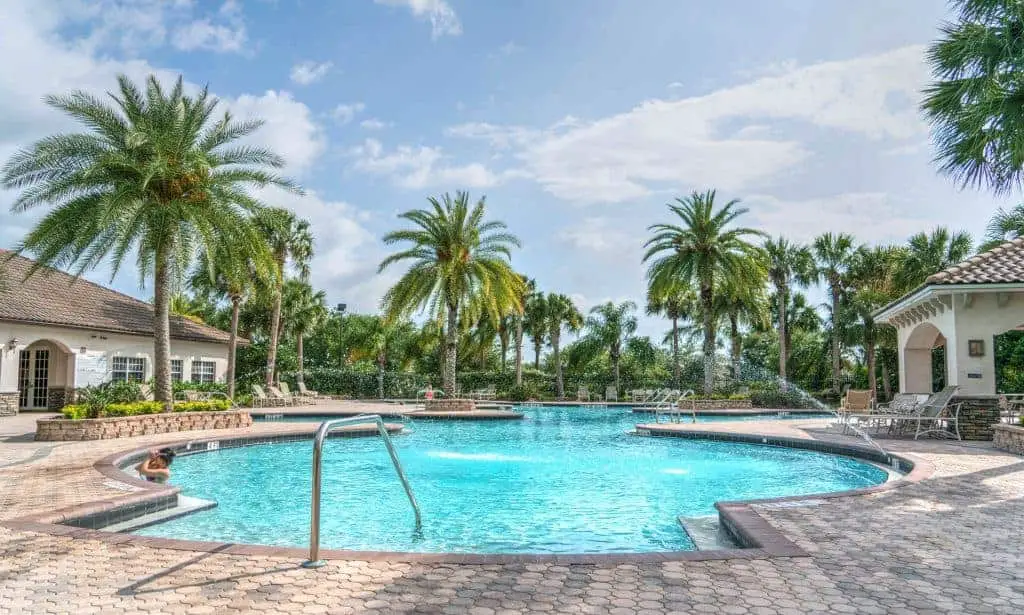What Is Salt Water Pool Conversion?
 To put it as simple as possible, salt water pool conversion means turning your pool into a salt pool. Just as the name implies, you add salt to the pool water instead of chlorine.
To put it as simple as possible, salt water pool conversion means turning your pool into a salt pool. Just as the name implies, you add salt to the pool water instead of chlorine.
Most pool owners know that the salt pool is beneficial but do not really understand what it is. For instance, many believe that the water would be similar to what exists in the ocean.
In reality, in a salt pool, only a small quantity of salt is used in order to obtain chlorine.
The chlorine you have in a salt pool is better than in the regular pool. You basically avoid having to deal with all the negative effects associated with it, like red eyes, itchy skin and smell.
Instead of the common chlorine tablets, a superchlorination feature is used. You can learn more about how the salt water pool works here.
In order to decide if a salt water pool conversion is good for you or not, you have to consider both the advantages and the disadvantages of salt pools. Here is what you need to know.

Salt Water Pool Conversion Advantages
The main advantages that need to be mentioned are:
1. Lower Costs
When you have a salt water pool, the chemicals you have to buy are a lot cheaper than with the traditional chlorine system. The evaporation of salt is not like that of chlorine.
The evaporated chlorine rarely has to be replaced. In most cases, you just need to add salt to the pool system 2 times per season. This sums up to $70 to $100 per year.
With the regular chlorine pool, yearly maintenance costs are between $300 and $800.
2. Softer Water
Even if chlorine is still present in salt water pools, the water is really mild. The salt content is similar to what you naturally get in human tears.
Swimming in the pool becomes a really pleasant experience as you are able to open your eyes underwater without feeling a burn or a sting.
3. Lower Maintenance
Saline pool maintenance is very simple. It is the salt system that gives you the chlorine you need.
While the appropriate pool chemical levels still need to be checked, this is really simple to do. When levels are not as they should be, the fix is simple.
4. You Avoid The Negative Effects Of Chlorine
The most common negative effects associated with chlorine use in the pool are smell, itchy skin, and red eyes. All of these disappear because of the lack of chloramines in the chlorine that is produced through the salt pool system.
When people swim in the pool they feel as no chlorine is present.
5. You Avoid Added Chlorine
The salt system will naturally manufacture chlorine. You no longer need to buy liquid chlorine, tablets or shock chlorine. While using the system you just dial in chlorine production and the system takes care of everything for you.
This is a very important advantage of having a salt water pool since with the regular pool system you have to add chlorine every single week. This includes when you go on a vacation.
If you forget about adding chlorine to the regular pool, various problems can appear, like chlorine locks.
Salt Water Pool Conversion Disadvantages
The main disadvantages you have to be aware of are:
1. High Repair Costs
Salt is corrosive to the metal parts present in the salt water pool is faced with more corrosion than with the chlorine-only swimming pool. Because many pool parts are made out of metal, you might have to frequently replace some.
In the event that chlorine levels are not properly maintained, there is a higher possibility that replacements are needed. However, the use of salt does play a role in the high corrosion of pool parts. You will need to deal with more frequent repairs.
2. High Initial Costs
A major disadvantage for homeowners is the cost of salt water pool conversion. You have to save at least a few hundreds of dollars in order to buy and install a chlorine generator.
In addition, there might be some specific needs that you have to deal with before the conversion happens. This is determined on a case-by-case basis.
The contractor will tell you exactly how much to expect to pay before the switch is made. Use this information to properly plan your budget.
As a general guideline, salt water pool installation costs around $400 and the cost of the salt water generator can be anywhere between $400 and $1,800.
3. Corrosive Water
Although pool professionals still have debates about this topic, it should be mentioned. Some believe that the water in the salt pool is too corrosive while others say this is not the case.
In reality, the pool pump’s shaft seal does fail faster. The fix is inexpensive. Also, a better nickel heater should be added to the pool whenever you use a heater system.
4. Replacing The Salt Cell
The salt cell has to be replaced every 3 to 7 years. This can cost anywhere between $200 and $700.
Also, there are more parts used by the salt system. All of them can become faulty, including the flow switch, flow sensor, salt cell, and circuit board
.
5. High Calcium & pH Build-up
The water’s pH level in a salt pool rises fast. It is important to control pH levels because when you do not, you end up with calcium that scales in the salt cell and the pool.
Fortunately, it is easy to test pool pH levels every single week. When levels go down, some muriatic acid can be added.
Conclusions
Salt water pool conversion is something that you naturally consider as soon as you learn about the benefits associated with it. However, your final choice needs to be made only after you consider both the advantages and disadvantages mentioned above.
Discuss with an experienced pool professional to see if the salt water pool is better for you or not. No matter the choice, remember that even the best swimming pools out there require maintenance. Costs easily go up when you neglect the weekly or monthly needed maintenance tasks.


